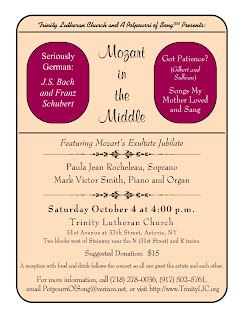Thursday, October 2, 2014
A Potpourri of Song℠ — Mozart in the Middle
Monday, July 14, 2014
Saving Net Neutrality, Economic Equality, and the Open Internet
To the Federal Communications Commission during this Open Comment period debating proposed rules regulating use of the Internet. Submitted on July 15, 2014.
I am a broadband user (3kbps DSL provided by Verizon) who believes strongly in the importance of a free and open Internet. As an ordinary citizen of very modest means who uses the internet every day for essential communications in my work, for access to the free press, for entertainment, and to keep in touch with acquaintances, friends, and family, I urge the FCC to reclassify broadband Internet access as a telecommunications service, thereby ensuring and supporting the concept of Net Neutrality.
The Internet is, by nature and by design, a public utility. When the Internet was opened up by the United States nearly forty years ago for public use, the expressed intent was to provide equal access to all. The development of new and increasingly less-expensive technologies to use this now essential part of our systems of communication, up to this point in time, has had a positive impact on every citizen of this country and, most notably, on billions of people on our planet. The Internet must be allowed to continue to be this beacon of light to all.
There are many examples of pubic services that through competent regulation by public service commissions provide equal access to the essential needs of our citizens. Among them are electric, water, and gas utilities — all of which are regulated so as to not discriminate against any one class of people, including discrimination by economic class. Telephone and cable services are also regulated by government in various degrees for exactly the same reason. The Internet must not be an exception to this model.
Most notably, government agencies like the State of Michigan, public schools, and state colleges and universities have a history of providing equal Internet access to all of its constituents — free of charge or at a fee affordable to all — further supporting the concept of government guarantee to open access to public services like those named above. FCC regulations must not interfere with state’s interests. Furthermore, a history of government support for fair and open access to the Internet also supports the concept that equal Internet access is a constitutional right for every person in this country.
The concept of "equal" may be debated; however, given the Internet’s history of original concept and intent, current regulatory protocols by various local governmental agencies, and the need for the ordinary user in this country to have timely access to a reasonable bandwidth (i.e., the current reliable service that I enjoy for $36.99/mo. plus tax), I submit that folks like me have as much of a right to immediate access to our email as a stock trader (virtual or human) has to immediately make split-second transactions. The FCC must reject proposed rules that would allow Internet service providers to divide the Internet into fast lanes for wealthy corporations and slow lanes for the rest of us. Those rules are simply unfair, unwise, morally wrong, and constitutionally unacceptable.
Do the right thing. Do not support the continuing division of this country into economic castes. Insure equal access to the Internet in the U.S. and, for that matter, for everyone on this planet. Keep the Internet free and open by declaring it a "Public Utility/Telecommunications Service" and by devising wise regulation that supports Net Neutrality.
Mark Victor Smith
Queens, NY
Tuesday, June 3, 2014
What’s in a [her-ricane’s] Name Anyway?
| Addison Adrian Ainsley Alex Alexis Angel Arden Ashley Aubrey Avery |
Bailey Beverly Blair Brett |
Cameron Casey Cassidy Chance Chase Cherokee Cody (Codi) Cory (Corey, Cori) Courtney |
Dakota Dale Dana Darby Darcy Devin (Devon) Dominique Drew Dylan |
Elliott Ellis Emerson (Emmerson) Emery Evelyn |
| Finley Fran |
Gale Grayson (Greyson) |
Hadley Harlow Harper Hayden Hayley Hillary Hollis Hunter |
Iman |
Jamie Jayden (Jaden, Jaiden) Jocelyn Jordan Joyce |
| Kai Keegan Kelly Kelsey Kendall Kennedy Kim Kimberly |
Lee (Leigh) Leslie (Lesley) Lindsay (Lindsey) Logan London Luca Lynn (Lin) |
Mackenzie Madison Marlowe Meredith Micah Morgan Murphy |
Noel Noor |
Parker Paris Peyton (Payton) Phoenix |
| Quinn |
Reese Reilly (Riley) Remy River Robin Rory Rowan Ryan |
Sage Sandy Sawyer Shannon Shelby Shirley Sheridan Shiloh Sidney (Sydney) Sky Skyler (Skylar) Stacy (Stacey) |
Tamara Teagan (Taegan) Terry Taylor Tracy (Tracey) |
Vivian Whitney |
